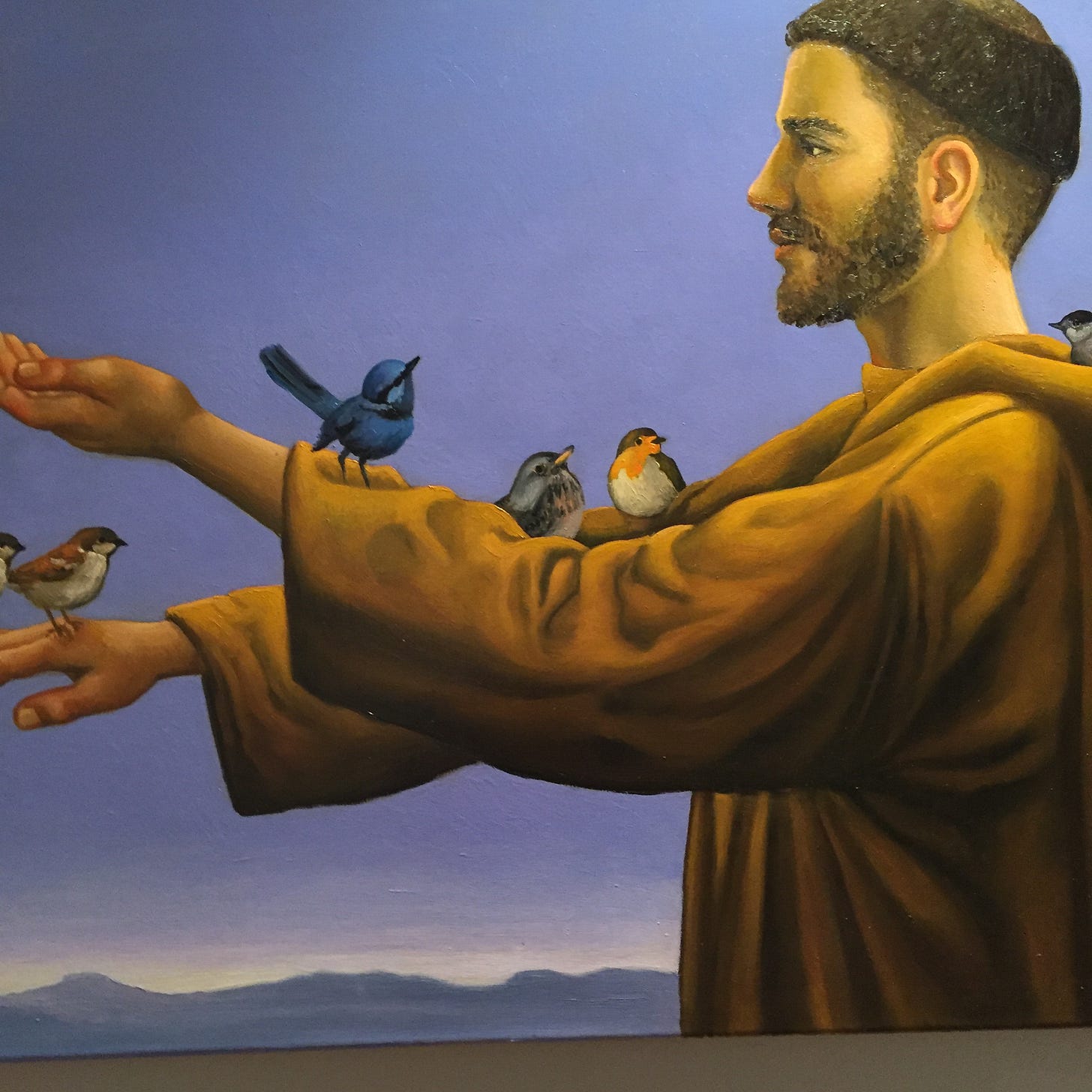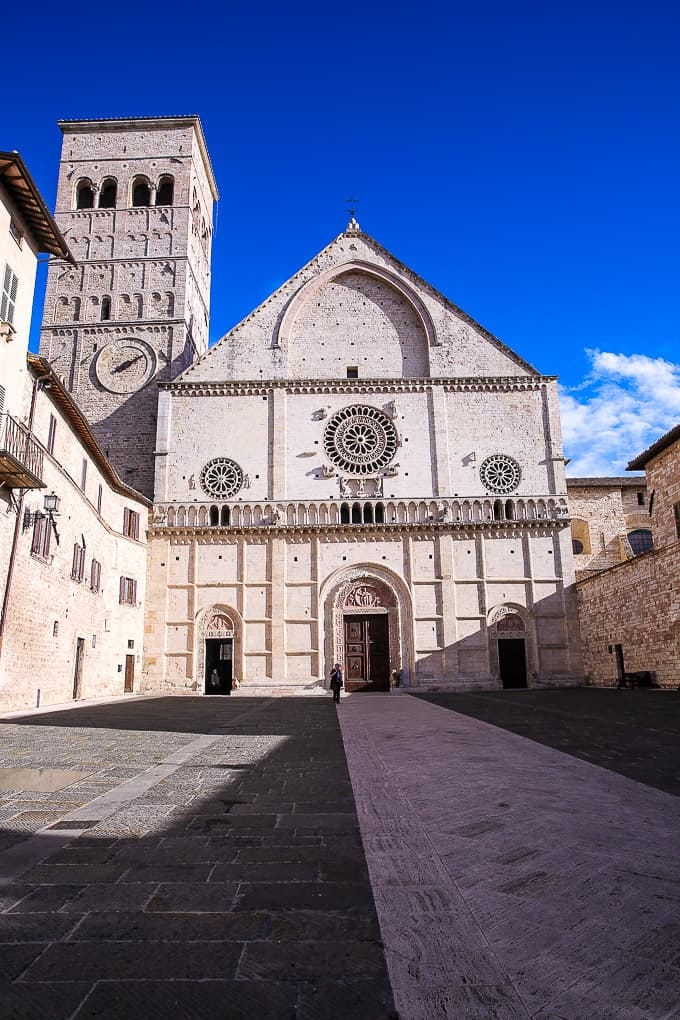Preach the gospel at all times. If necessary, use words.
Advent Day 16: Francis of Assisi (1182-1226)
Some people are hard-wired for what the apostle Peter called joy unspeakable (1 Peter 1:8). You probably know someone like this—no matter what’s going on in the world or what valley they’re walking through, it is well with their soul. They might not be happy all the time (happiness is circumstantial and of-the-moment) but they’ve always got joy. Francis of Assisi was that kind of person.
Francis was born in 1181 to a family of Italian cloth merchants. Like most children in the Middle Ages, his future was mostly determined by his social class. Since he was from a well-to-do family, it was expected that once he came of age he would get married (to someone of the same class), have children, and enter his father’s business. In the meantime, however, he had ample free time and money to spend on wine, women and gambling.
In 1202, seeking adventure, Francis joined a military expedition against the nearby city of Perugia. But instead of finding glory on the battlefield, he was captured and tossed in jail where he languished for a year before being ransomed.
The Francis who returned to Assisi was not the one who’d left. Prison had transformed him from a high-spirited boy with a taste for frivolity into a mystic with a heart for the way of Jesus. Now, rather than join his father’s business, he began to pilfer silk from the warehouse so he could sell it and give the money to a local priest.
When his father got wind of the scheme, he had his son arrested and dragged to the public marketplace where Francis was put on trial before the bishop. Not to be outdone in the grand gesture department, Francis stripped off his fine clothing. Naked, he renounced his inheritance and pledged his devotion to the poor and suffering of the world.
Francis didn’t stay naked for long. Soon he donned a coarse brown cloak, tied it with a rope, and took up residence in the woods outside Assisi. Far from missing his old life, he radiated joy. This was a man radically freed.
Like all mystics, Francis felt the deep intimacy of incarnational Christianity. If it was true that God loved things by becoming them, then all creation must contain God’s divine DNA. God was in trees and rocks and river, the beggars and lepers among whom Francis now lived and, yes, even his father and the bishop. Francis praised as siblings his Brother Sun and Sister Moon, Brother Wine and Sister Water. Like this, his life became a prayer, his lifestyle the only message he needed.
Not surprisingly, Francis the holy fool became the butt of jokes among old buddies. Nor were the local priests big fans, worried as they were that Francis’s example of simplicity and devotional service would draw negative comparisons with them. But Francis’s joyfully liberated life quickly began to attract followers, including a young woman named Clare who later founded the order of the Poor Clares.
Once Francis had been joined by twelve disciples, he decided it was time to create a rule for the rag-tag bunch to live by. The rule was as simple as it was profound:
…to follow the teachings of our Lord Jesus Christ and to walk in his footsteps.
This meant taking a vow of poverty, committing to nonviolence, and not only caring for but seeing God in all creation, no exceptions. And if anyone wondered what Francis’s inspiration for this rule was, they needed only to open their Bibles and read the stories of Jesus.
Always in precarious health, Francis’s last years were marked by those strange and seemingly incompatible twins: physical pain and joy unspeakable. When the end was near, Francis asked his fellow friars to lay him on the bare ground. Then he offered them a blessing:
I have done my part. May Christ teach you to do yours.
Francis died on October 4, 1226 at the age of forty-five. A friend to every experience, right up until the end, his last words were, Welcome, Sister Death.
Practice
Read the Prayer of Saint Francis then spend time in silent contemplation. If your meditation is typically under 20 minutes, add a few minutes to what you are used to doing. If you feel your mind drifting during contemplation, repeat one of the lines of this prayer (e.g. where there is sadness, joy) to bring your presence back. If you need to repeat it over and over like a mantra, that is fine. The goal is to be present, not perfect.
Lord, make me an instrument of your peace.
Where there is hatred, let me sow love;
Where there is injury, pardon;
Where there is doubt, faith;
Where there is despair, hope;
Where there is darkness, light;
Where there is sadness, joy.
O divine Master, grant that I may not so much seek
To be consoled as to console,
To be understood as to understand,
To be loved as to love;
For it is in giving that we receive;
It is in pardoning that we are pardoned;
It is in dying to self that we are born to eternal life.
Holiday Happenings at Life In The City
Dec. 11, 11:15 am: LITC’s original musical, Make Room In Your Heart.
Dec. 21, 7:30 pm: Blue Christmas, an intimate service for the longest night of the year.
Dec. 23, 7:00 pm: Our annual Christmas Eve-Eve service.
Dec. 25, 11:15 am: Celebrate Christmas morning with your church family.
Jan 1, 11:15 am: A quiet, contemplative service to welcome 2023.
Catch Up On Recent Posts
Read the Introduction to The Heart Moves Toward Light: Advent With The Mystics, Saints and Prophets.
Recent posts can be found in our Archive.






I had no idea until I was researching more about Mass that Bernstein wrote Simple Song about Francis. It makes so much sense. Thank you for sharing these Greg. They are such a gift!